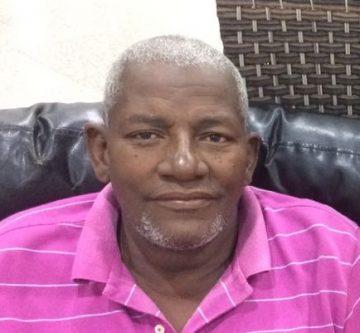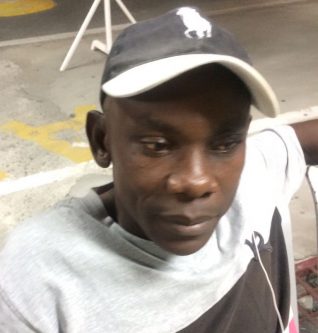
Wendella Walton: ‘I am very much concerned about the young people and their activities in crime but I believe that they’re influenced by what happens in many of the homes.
I work with young people and a lot of these young people, they’re not having adults paying much attention to them as far as rearing them, bringing them up, seeing that they instill in them good values and so on. In some of these homes there is a lot of negation. People are very negative about them… like telling them that nothing good could come out of them, telling them things like, `you’re just like your father’ and all kinds of things.
Depriving them of basic needs and because of that, because of this lack of interest that parents would show in them and concern and love and all of that, they get themselves into the wrong company and so you find that for them to have their needs fulfilled, you find them committing crimes. You find them getting involved in risky behaviour so I think that is kind of responsible.
I’m not blaming adults completely but quite a lot of adults are not taking this whole thing about parental guidance seriously and so they are not doing what they’re supposed to do. They are failing our young people. Adults, parents, are failing our young people, trust me.’

Edwin Walton: ‘I feel there’s a need for corporal punishment. When they took away corporal punishment, they didn’t put anything else in place so the children are running wild. In the Bible in Proverbs you see that withheld, the child would bring shame to the mothers…
I grew up in a home that if I did anything my father would give me a couple of licks and I didn’t turn out to be a delinquent or to be anything bad. I’m a responsible father, I have my wife, we have children and we didn’t turn out bad. None of our children turned out bad either.
So that is one of the factors that is causing delinquency in this country, the lack of corporal punishment and no form of punishment whatsoever. That is what is making the youths so rebellious and so bad that children, just imagine children in school are telling their teachers that they’re not doing this. In my day I couldn’t tell Mr Jones or Mr Parris or Ms Barclay or one of those teachers I wasn’t doing this or that.
I would have gotten a good thrashing and when I went home my mother would have given me the rest.’

Mr Adrian: ‘I think the music is too lewd and it encourages young people into violence. It’s not just the genre, I think it has to do with the lyrics of music, the messages that are coming over, and it’s not just the violence but also the way we react to women in society.
Music as I know it, it seeps into your subconscious and eventually now you start to live it. And I think that’s the number one reason that causes people to get into violence.
I won’t rate movies as much as music because I’ve studied music a lot, I understand exactly how music interferes with the human psyche. I could go back to the Bible, I could go back to religion. Music was created to react with the human being in a way that God wanted it to react with them and when that music goes chaotic it interferes with the human psyche.’

Godfrey Garnett: ‘What I can say, the poverty that we in, the young people are in, the ones who are at the top don’t have any time with them to get them out of what they’re in. Everybody is trying to get at the top and everybody is trying for themselves all the time. Another thing is, let’s say I’m your father.
We go through a poverty line all the time and as soon as you reach a certain age I don’t have time with you, I don’t want to send you to school anymore because the money that I’m earning is not enough for me much less you guys. So it’s a terrible thing going on in this country, a really terrible thing. Music, movies, all those things aren’t for children because children believe in those things and it makes them more foolish. The music you hear in the buses these days is making the youths crazy.’

Karen Budhram: ‘People are individuals, everybody goes through their own struggles and sometimes somebody is just prone to crime, which I do not condone. But other people would have other pressures that would cause them to act out of desperation and we don’t know the reality of any of it, nobody actually knows anybody else’s reality.
I think in anybody’s case, any person who comes to crime, sometimes it’s a mixture of both nature and nurture; sometimes it’s just your environment. I think social media does impact the youths of the world, it’s not just Guyana. People, they feel like what they should aspire to is a fancy lifestyle; affluence. Mass media definitely plays a factor but how much they influence you is up to the individual.’

Shaka Sealey: ‘From my perspective I would say it’s because of a lack of finance. I think mass media has a slight influence but not as much, I believe it’s mostly due to peer pressure, like your friends getting you into bad stuff. Family influence could also contribute to it but not definitely.
So for me the most influential would honestly be lack of money and lack of free time, and lack of jobs and that kind of stuff. You don’t really find rich people robbing and doing crime and that stuff, in my opinion.’

Alister Charlie: ‘From my perspective, we will find the youth particularly will turn to criminal activities because number one, the lack of job opportunities.
We find in the education system at this time there is no place for them, the career that they want to pursue, that’s one contributing factor that leaves them with no option than to turn to criminal activities. Our unemployment rate is so much higher at this time where they don’t have youth in the working force and these are the main contributing factors from my perspective that will have an impact on the lives of the youth in Guyana…
They have to live, they have to live. And they will turn to criminal activities because there are no opportunities for them to move on. And you will find that a lot of educated youth who don’t have jobs, what will they do? I am not endorsing them to become criminals but there is nothing in the country at this time for them. You may do your utmost but it’s the mindset of an individual, and your mindset is based on a lot of factors. I must say that the media and the public they are doing what they have to do but it all depends on your individual mindset.’

Sean Thompson: ‘It’s basically a problem economically for the country and so I think people are looking to earn and earn money fast, so they’re looking for the easiest way out and hoping to not get caught. Also, for some persons it may be from family issues and how they were brought up. So they think that crime is comforting or something to turn to. And in today’s society where most homes are fatherless and they don’t have that father figure to guide them in the right way, they tend to turn to crime.
I think mass media has an influence to an extent, but I still don’t think that a normal person would turn to crime if they’re not going through some sort of stress or strain or something of the sort.’

Michael Griffith: ‘The possibilities in terms of jobs or security, employment, it’s more or less that a lot of youths don’t really see a way out or they’re not aware of the possibility that are there for them. Peer pressure plays some amount in it but
looking at it holistically, the persons that are influencing them, they also are victims of not seeing a choice or not seeing the possibilities…so it comes back to the opportunities not being there for them or the authorities not really doing enough to provide opportunities for them, whether it be just work or opportunities to learn trades or whatever.
I think the persons that are aware of the problem within society have to at some point collectively start making an effort either to educate in terms of making them aware of the opportunities or the possibilities to deviate from the current course that they’re on or put pressure on the government to have them do whatever they could do to educate them on alternative means.’

Qubilah Quallis: ‘There are many factors that would influence youths to turn to crime. I personally think that some do it because they are seeking attention from their families. Family members get caught up with their own lives and sometimes forget to focus on the needs of other family members, hence they act out. Also it could be the environment in which they are raised that would motivate them to go into these activities. In some cases, some families support this kind of lifestyle.
I think what we need to do is to start teaching the children who grow up in depressed communities that dreams come through once they work hard and that fast money is never the way. But they can only be taught this through the support of their families.’

